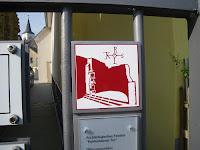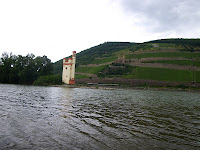Having the day free with finer weather but with H unable to join me, I didn't want to have too grand of an adventure or venture too far from my little apartment, so I decided to revisit some of the romantic scenery at the beginning of the Mittel-Rhine that we had seen together before, the plunging valleys with a mighty river coursing below and the ensemble of villages and castles cleaving to the ridges and flatter lands until overtaken by vineyards—just from a different angle. On the way to Bingen am Rhein, I stopped first to explore the village of Ingelheim, host to the ruins of an imperial palace of Holy Roman Emperor Charlemagne (Karl der Große).

The emperor decided in the late eighth century to transform the existing, ancient manor of a Merovingian king into a stately palace—the village being kindred to our fair city, leagues away in Bavaria, but also commissioned by Charlemagne to include a few forts, a residence and a town wall that's heart-shaped for his wife (I still like that story even though probably no one thought to draw a heart like that or particularly associated the organ with love until much later).
Destroyed by the battles during the Thirty Years War and the wars of the Palatinate's succession, the palatial remains were fully incorporated into the architecture of the town and the extent of the ruins were really forgotten until they were rediscovered as architectural elements throughout the town by archeological studies and showcased, opening up the land that was the Aula Regina, beginning in the early 1990s.
 Last summer
Last summer, H and I had the chance to see the colossal statue Germania, the Niederwald Monument, from the opposing bank of the Rhein, taking a gondola ride from a station in Rüdesheim that clipped the vines as it flew up the hill to the park above and look down at the river from above.
The city of Bingen is directly across and I remember gazing at it from a distance back then and wondering what all there was to discover.

I trekked across the city and visited the Basilica of Saint Martin and former grounds of a once expansive nunnery that's provided a wealth of early medieval artefacts, including the first inscriptions ever found in German, the written testament to the language copying Roman tablets and I climbed to the top of the dominating tower of Burg Klopp—now the administrative offices of the local government but fully accessible to the curious and with some beautiful landscaping that highlights the fortress and ancient foundations, for a spectacular view, even though the skies turned a bit threatening.
I went back down into the city next and crossed the park that ran along the waterway—there were a lot of cultural and historical installations to look at—and got progressively better views of Germania and the famed
Mäuseturm, Mice Tower, on an island in the Rhein.

I got the tale mostly right about the greedy and cruel archbishop of Mainz who exacted such high tariffs on passing boats that the peasants could not afford grain and the bishop in his tower was besieged by an avenging army of mice that ate him, along with the grain he was hoarding, in retribution. I like this story too, even though it's more likely that the name derives from the Old German infinitive
mûsen for spying or lying in wait, since the strategic location of the tower with the defensive fortresses around it allowed the rulers of this bend in the Rhein to control trade. I was surprised how close one could get and how peaceful it seemed, no crowds and I had the view all to myself and could well imagine again how the romantics were inspired. I rather like too the creative explanations and etymologies.















